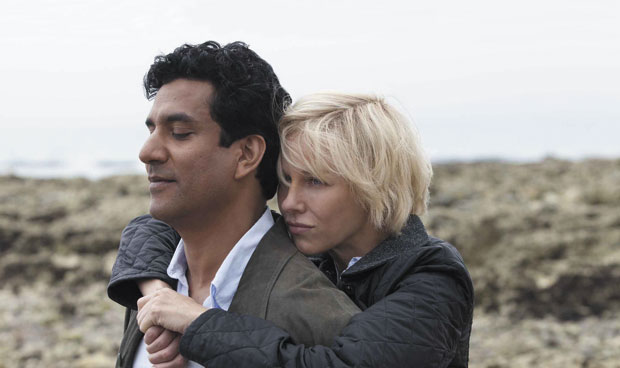
Directed by Oliver Hirschbiegel
Starring Naomi Watts, Naveen Andrews, Cas Anvar, Charles Edwards, Geraldine James
German filmmaker Oliver Hirschbiegel (Das Experiment, Downfall) and a solid cast do decent work with this story of the relationship between Princess Diana (Naomi Watts) and Hasnat Khan (Naveen Andrews).
Hirschbiegel’s film is not a full-fledged biopic, per se; the film is focused on Diana’s relationship with surgeon Khan following her separation from Prince Charles. Additionally, the royal family is kept at a distance, often spoken about but never seen, which means the film is a kind of microcosm, focusing on two people trying to live a private life while large events swirl around them.
And therein lies the key problem with the film: it’s a largely conjectural affair. With Diana in her grave and Khan a notoriously private man – one of the key reasons for the failure of their relationship, the film repeatedly states, is the camera-shy Pakistani doctor’s issues with dating the most famous woman in the world – we can’t know the exact details of their time together. Screenwriter Stephen Jeffreys is given the unenviable task of filling in the gaps – unenviable because any deviation from verified truth is an easy target for critical vitriol.
‘Vitriol’ is perhaps too light a word to use here, though; the reviews for Diana have been beyond scathing, and frankly it’s difficult to see why; while far from a perfect film, it’s a serviceable enough piece. Watts, always an eminently watchable screen presence, manages to inject some inner life into a figure who, despite her level of media exposure, remains largely enigmatic, and Andrews is stolid but still charming as Khan. Problems arise when the film occasionally lurches across the line into melodrama, and the repetitious nature of the Khan/Diana relationship (the film is, by and large, a series of two-person scenes as the pair dodge public attention and try to grab some quiet time together), but they’re not insurmountable. Hirschbiegel gets good mileage out of a number of thematically significant elements, such as the brown wig Diana repeatedly uses to disguise herself and, given what we know about the princess’ eventual fate, the ever-present paparazzi become, in this text, threatening harbingers of trouble to come.
Diana does falter in the last act, which glosses over Diana’s relationship with Dodi Fayed, the better to keep the focus on its central pairing, and frankly much of the flab could be trimmed to the betterment of the piece. Still, you get the impression that the film’s biggest sin in the eyes of its critics was even attempting to tell a story about such a controversial and iconic figure – doing so left it open to attack from Diana’s admirers and detractors alike, with the result that it’s unlikely to find an audience of any kind.
_ TRAVIS JOHNSON